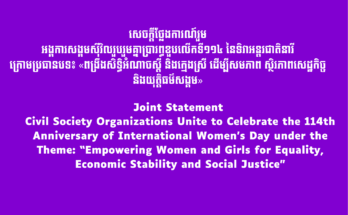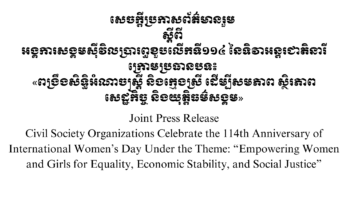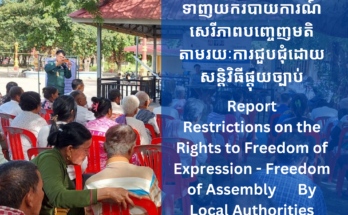Background of ADHOC:
The Cambodian Human Rights and Development Association (ADHOC) was founded by a group of former political prisoners in December 1991 after the signing of the Paris Peace Agreements on October 23, 1991. ADHOC is an independent, non-partisan, non-profit and non-governmental organization. It has different levels of governance: a General Assembly which is convened every three years to elect a President and Secretary General, and a Board of Advisors which meet annually.
ADHOC is tasked to address the absence of basic rights, freedoms and liberties in Cambodia by providing people with knowledge and understanding of human rights, law and democracy and of how to defend these rights and freedoms themselves.
Management
ADHOC is an independent, non-partisan, non-profit, non-governmental organization. The General Assembly which meets every three years, is the highest policy-making body of the organization. The General Assembly elects a President and a Secretary General to supervise the overall management, administration, finance and implementation of program activities implementation. The Annual Assembly, in which all ADHOC staff participate, is held each year to review past program implementation and to make necessary recommendations for the next year’s plan of activity and budget. The Donors Meeting is convened annually to provide all ADHOC funding agencies with an opportunity to review and improve the past year’s program activities implementation and to contribute to the planning of next year’s program.
The Advisory Board meets every year at a date set by the Management Committee in order to discuss ways to improve the implementation of program activities. The Monthly Meeting is a give-and-get advice session; participants include provincial staff who rotate, heads of the Advocacy and Monitoring sections and Program Officers. The Management Committee conducts weekly meeting to review the implementation of the program activities, to assess the central and provincial staff’s performance and service delivery, and to take action or to make decisions on on-going matters. The Management Committee also conducts weekly consultations with staff to share information in regards to program implementation, to formulate annual plans of activity and budgets, to make decisions on the program operation and to approve all office and personnel policies.
Coverage
ADHOC is comprised of Human Rights Program, Land and Natural Resources Rights Program and Women’s and Children’s Rights Program. The Association has its headquarters in Phnom Penh and provincial offices throughout the country (23 provinces).
Programs
ADHOC is divided into two main sections: the Human Rights Monitoring Section and the Women and Children’s Rights Section. They consist of the following programs:
A- Human Rights Program
The Human Rights program monitors the situation of human rights in Cambodia through investigation and intervention into human rights violations and gathering and recording information on cases. The human rights program staff investigate complaints, give assistance to victims, monitor prisons, lobby for change, engage in national and regional campaigns and advocacy and publish reports.
B- Land and Natural Resources Rights Program
The Land and natural Resource Rights Program staff are extremely busy in Cambodia’s current climate, where vital land is being sold for development without proper impact analysis or compensation arranged beforehand. As a result, many people are forcibly evicted from land that is the main source of their livelihood, and forced to migrate to areas far from basic services such as education and health clinics. The main activities of the Land rights program are:
Community empowerment- educating the population at risk of their land rights and encouraging them to defend these rights;
Investigation and intervention- investigating land rights violations and intervening through material/legal assistance to victims, petition and filing complaints to teh courts and the relevant authorities;
Creating a culture of dialogue between grassroots communities and local/provincial/national authorities- ADHOC holds workshops to facilitate communications between authorities and community representatives in order to encourage cooperation and collaboration. Land rights abuses are often linked to government officials or are exacerbated by judicial corruption, therefore this is an extremely important activity. This can be a preventative measure but also these workshops and subsequent meetings can be vital in resolving land disputes.
ADHOC also engages in land rights advocacy through press statements and conferences, publication of thematic reports and cooperation with the National Human Rights Commission in serious cases.
C- Women’s and Children’s Rights Program
Women continue to be treated as second class citizens in Cambodia, due to a culture and tradition which is heavily engrained and cannot be changed overnight. Progress is being made, through the work of NGOs and the Ministry of Women’s Affairs, however much is left to be done. Domestic violence is still seen largely as a family matter in Cambodia and instances of rape are on the rise. Women who report abuse against them face criticism, stigmatisation in their communities and often heightened violence from their abuser.
The women and children’s rights section work towards improving the situation for women in Cambodia through investigation and intervention in to cases of abuse; empowering women and informing them of their rights; carrying out anti-discrimination training for men and women in communities; assisting women who have been victims of abuse in their reintegration back into their communities; holding safe migration trainings to ward against human trafficking; and engaging in advocacy through the press and the publication of reports.
Special Projects
ADHOC also engage in special projects that are separate to above core activities but are also related and can overlap. The KRT project runs adjacent to the ECCC, assisting Civil Parties in their participation through holding information sessions, training Civil Party Representatives, working on the court legacy and accompanying victims to the court.
The Alternative Dispute Resolution (ADR) project, in partnership with TISCO in the Netherlands, concentrates on providing access to justice to vulnerable Cambodians, for home the court system is often out of reach, Cambodia suffers from a corrupt judiciary, therefore this project is extremely important and contributes to judicial reform. The project facilitates the resolution of minor disputes among community members through mediation, thereby keeping the peace while also removing some of the burdensome caseload from the Cambodian courts.



